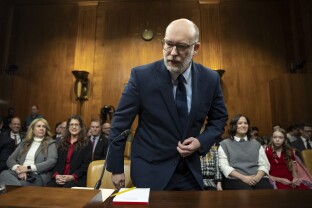Donald Trump is using the Office of Management and Budget to bend the federal government to his will and test the limits of a legal theory that could change Washington as we know it.
OMB’s sweeping memo Monday pausing federal grant programs was quickly blocked by a federal judge on Tuesday afternoon, who stopped the order from taking effect until further legal review.
But Trump, his nominee to run OMB, Russell Vought, and general counsel for the agency, Mark Paoletta, have all publicly said that a Nixon-era law meant to reassert Congress’ spending power, the Impoundment Control Act, is unconstitutional. And they seem prepared to see that theory through, with Vought’s OMB running the show.
“The president ran on the notion that the Impoundment Control Act is unconstitutional. I agree with that,” Vought told senators during his confirmation hearing last week.
And Paoletta has argued that the president has a constitutional right to reject congressionally appropriated spending, writing on X in November, “Impound, Baby, Impound!”
If, under a legal challenge, a court did overturn the 50-year-old law, it could set a new precedent for challenging Congress’ fundamental constitutional leverage as a check against the president — the power of the purse — and open the door to dramatically expand the president’s power to implement plans like the sweeping funding pause it did Tuesday, supporters of the law argue.
OMB’s headline-grabbing memo was the latest — albeit largest — attempt at using federal funding to implement a policy agenda since Trump took office. His first week of executive orders blocked federal funds from “sanctuary cities,” stopped money going out the door for Biden-era laws and paused foreign development aid.
The White House argued that the pause was only temporary, putting out a second memo late Tuesday that attempted to frame funding blocks as simply “temporary pauses” instead of illegal impoundments. But the not-yet-confirmed Vought, an architect of Project 2025, would be a chief decision-maker on what makes it through.
“I also spoke with the incoming director of OMB this morning, and he told me to tell all of you that the line to his office is open for other federal government agencies across the board, and if they feel that programs are necessary and in line with the president’s agenda, then the Office of Management and Budget will review those policies,” White House press secretary Karoline Leavitt said at Tuesday’s press briefing.
The legal foundation for a president to outright halt federal spending for policy reasons is shaky at best, and perhaps even downright illegal, according to experts.
The ICA requires a president to go through a process if they want to delay or cancel funding Congress has appropriated.
“The original [Trump] memo was extraordinarily broad and really did seem like an effort to resurrect Richard Nixon’s claims about his ability to control federal spending, and that is something that’s been settled law and practice for 50-plus years now,” executive branch expert Andrew Rudalevige told NOTUS.
As the law establishes, there can be programmatic delays — for instance if not enough qualified applicants submit for a government grant, and the funds go unappropriated. The president could also send a letter to Congress asking to rescind the spending, but if Congress doesn’t do so, the executive branch is required to appropriate the funds.
“Put simply, it is illegal and contrary to our constitutional structure for the president to disobey appropriations acts duly enacted after Congress publicly considers and determines funding levels for the federal government,” Citizens for Responsibility and Ethics in Washington wrote in a letter to a congressional leaders on Monday, before the government-wide funding freeze was announced.
Trump indicated he didn’t plan to follow this law on the campaign trail.
“I will use the president’s long-recognized Impoundment Power to squeeze the bloated federal bureaucracy for massive savings,” Trump pledged in 2023.
During his confirmation hearing last week, Vought defended the executive orders passed to date as “programmatic delays,” not impoundments.
Democratic senators are raising alarms about the administration’s attempts to circumvent the law and the constitutional separation of powers it’s based on.
“How can we ever have an agreement in the future if a president — whoever he or her may be in the future — has say over that, saying, ‘No, nevermind I’m not going to pay for this part of it,’” Sen. Patty Murray told Vought during the hearing. “We have to have agreements, it is the law of the land.”
As for the White House, Leavitt told reporters Wednesday morning, “Everything this administration does is within the confines of the law, and so we’re prepared to fight this battle in court.”
This story has been updated with additional comment from the White House.
—
Claire Heddles is a NOTUS reporter and an Allbritton Journalism Institute fellow.
Sign in
Log into your free account with your email. Don’t have one?
Check your email for a one-time code.
We sent a 4-digit code to . Enter the pin to confirm your account.
New code will be available in 1:00
Let’s try this again.
We encountered an error with the passcode sent to . Please reenter your email.


